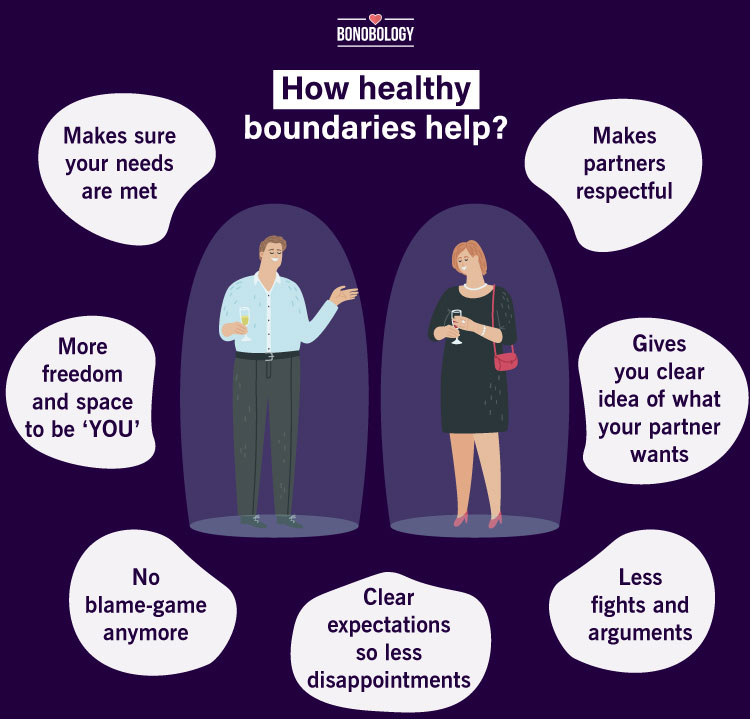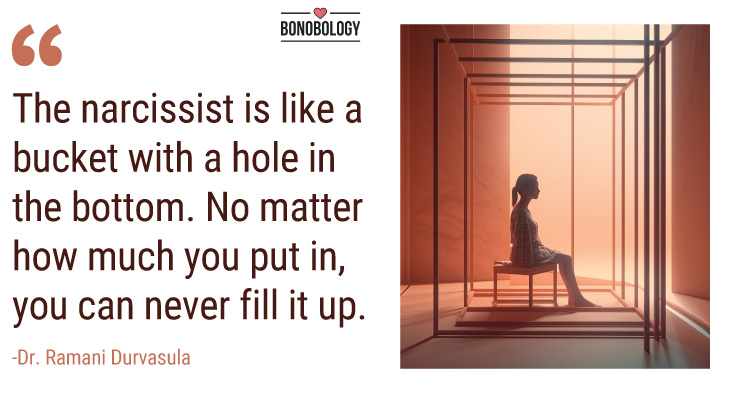“My wife thinks I don’t respect her boundaries. At least that’s what she wrote in her diary!” This can pass off as humor but sadly, it isn’t just a joke. It is an example of how most married couples either mock boundaries or are totally clueless about setting boundaries in a marriage. To most of us, marriage is about barging into each other’s space any time and ridiculing the idea of ‘personal space’ once married. Studies suggest that marital therapists use the idea of ‘boundary’ in a relationship as a useful tool to determine who is responsible for what and to assign a sense of accountability for behaviors, feelings, thoughts, tasks, and so on. .
To shed more light on how boundaries can define whether a couple would have a happy relationship or not, communication coach Swaty Prakash (PG Diploma in Counseling and Family Therapy), who also specializes in addressing issues in couple relationships, writes about boundaries in marriage and the 15 critical boundaries that experts around the world recommend.
What Are Boundaries?
Table of Contents
The few words a marital journey begins with are – forever, two become one, soulmates, and so on. But ‘forever’ is not really ‘always’ or ‘24X7’ or ‘together in everything’. These beautiful yet very demanding terms are often mistaken for some stifling and dangerous synonyms. As a result, the couples begin their ‘happily ever after’ with an expectation to become one, with no space in between.
An impossible feat, such aspirations lead to suffocation and friction. This is why, understanding boundaries and setting them does not happen in the middle of a fight, but much earlier so the fight doesn’t happen at all.
So, what do healthy boundaries look like? A personal boundary is:
- An imaginary safety shield around you that keeps you connected with your partner(s) while also making sure that you limit your emotions and energies while dealing with others
- Helpful in bringing forth choices to act, react, and respond instead of burdening you and others with excessive expectations
- Like a roadmap to your choices, wishes, needs, and aspirations and if both the partners etch boundaries for each other to see, they shed perceptions and come forth as who they really are
Effective boundaries:
- Are clear and reasonable
- Take care of your needs as well as of your partner’s
- Set clear expectations in relationship
- Help couples stay away from blame game
- Don’t make you selfish or controlling
Related Reading: 21 Elements Of Developing Respect In A Relationship
Why Are Boundaries Important In Marriages?
When two people fall in love, they almost become blinded and biased toward each other. Flaws and differences take a backseat and everything looks perfect. But things obviously change when this initial honeymoon phase goes by and a) their real personalities clash, b) or one of them resentfully compromises, c) or they withdraw from one another.
Healthy boundaries in a marriage mean letting the other partner know your needs and who you are as a person. Here’s why you need to create mutual boundaries with your spouse:
- Boundaries help partners define ownership and responsibilities
- Boundaries remove the vicious circle of blame-shifting
- Boundaries ensure respect for self, and each other
- Boundaries ensure both partners have an equal say in the relationship
While there is no ‘one size fits all’ solution when it comes to setting reasonable healthy boundaries in a marriage, here are some common ones you need to establish early on:
- Physical boundaries
- Sexual boundaries
- Emotional boundaries
- Family boundaries
- Social media boundaries
- Financial boundaries
Sometimes when couples do not have any marked boundaries, they end up feeling hurt, misunderstood, violated, confronted, insulted, and rejected at various instances. In couples sans boundaries, such complaints from each other are quite common and sometimes catapult into much larger issues over time. Here are a few examples of how couples find problems with each other when they have no set boundaries between them.
- How can you just leave me on a Saturday night and go out with your friends? You know how miserable I feel when you are out partying
- Washing dishes is not my only job! I know you are tired too but I can’t do these household chores by myself. Every time I hug you, you become so stiff. Why don’t you tell me if you don’t like being hugged or is it that you don’t like me anymore?
- My spouse’s parents disrespect me all the time. Why can’t he ever go and meet them alone?
- I don’t like that friend of yours. She tries to get very close to you physically. Can’t she stay away?
- You are such a spendthrift! I am the one who struggles with paying bills and school fees while you enjoy shopping
How To Set Boundaries In Marriage
Remember the game of treasure hunt that we played as kids, where the treasure was hidden by one and sought by the rest? Whenever the seeker went too far away from the ‘treasure’, the treasurer kid would scream “cold!” while if they were close to the object, the kid would jump nervously and scream “hot!”.
Well, a marriage is much like this game. You come too close to the partner and it becomes too hot (unfortunately, not in a hot, romantic way) and when you step far away, you realize that it is now too cold.
So how do you make sure that your interactions with your partner are neither too hot nor too cold? How do you stay away just enough to rush back in time? Here is how partners can set clear, reasonable boundaries and find the best way to protect a marriage.
- Set them early: Set the boundaries early in the relationship so that it doesn’t feel awkward later and, in fact, helps build a healthier bond that only strengthens with time
- Don’t make it about you alone: Two people are in the relationship and so a marriage needs both the partners to communicate their share of limitations, discomforts, and boundaries
- Focus on ‘I’ statements: Don’t make it accusatory or a way to condemn your partner. Communicate your feelings and tell them about how you feel and not what they do/don’t do. Instead of saying “When you do this …”, choose to say: “I feel … when …”
Related Reading: 9 Signs You Have Serious Communication Issues In Your Relationship
15 Critical Boundaries In Marriage Experts Swear By
Now that you know how vital boundaries are in a marriage, here are 15 critical boundaries marriage experts from around the world have listed for a healthy marital life.
1. Let the past be in the past
Alex and Sophie met on a dating site and would talk for hours about everything a newly in-love couple would talk about. Fears, insecurities, feats, family, but while Alex told Sophie all about his past relationships, Cynthia chose to not divulge much.
Two years later, they decide to marry but Alex was now insistent on knowing everything about her past sexual encounters and wouldn’t take no for an answer. For Cynthia, it was a boundary she wanted to set two years ago but didn’t do it properly. They couldn’t get past this difference and broke up.
We are not recommending lying to your partner about your past, but it is very important to set boundaries about how much you want to talk or discuss about your past relationships.
Example: “I do not wish to share anything about my past sexual experiences unless it has a direct impact on your physical/sexual health.”
2. Your key to happiness should be in your pocket
While partners should do things for each other’s happiness, putting the entire onus of your contentment on the partner is unfair, impossible, and a perfect recipe for disaster. So take the reins of your happiness and be responsible for your feelings. A happy partner doesn’t weigh down the marriage with expectations and grudges.
Self-love is not selfish or narcissistic, instead it boosts mental health, self-esteem, and harmony with partners. As Jeffrey Borenstein, president of the Brain & Behaviour Research Foundation,, puts it, “Self-love means having a high regard for your own well-being and happiness. Self-love means taking care of your own needs and not sacrificing your well-being to please others.”
Example: “I understand you’re missing me, I miss you too. But I can’t spend time with you when I’m in the middle of work. It affects my productivity.
3. Your friendships are just as important for you to nurture
A major cause of rift between couples is an underlying jealousy or suspicion. This emotion stems from the conditioned thought that partners should not have close friendships outside marriage. If you and your partner can set these boundaries and discuss the importance and need of individual quality time with your respective friends, trust us, both of you would be in a much more enjoyable and happier space.
Example: “I would love for you to bond with my friends but I would like to hang out with them on my own as well. I encourage you to do the same with your friends.”
Related Reading: 7 Reasons To Have Your Own Friend Circle Distinct From Your Spouse
4. Be clear about how much can your partner share about you
Not everyone is comfortable discussing their lives with families or friends and partners come with different attachment styles. So in case you are a private person who doesn’t pick up the phone and tell every detail to your best friend or family at the drop of the hat, let your partner know this about yourself.
Some families like to discuss each other’s lives at every gathering while many others keep the little details to themselves. If you and your partner have different stands on this, it is best to set boundaries about how much and what all can be discussed with others.
Example: “I am not comfortable talking about my salary and job profile with your family. Please keep such information to yourself and don’t discuss it with them.”
5. Decide to talk respectfully with one another
The conflict resolution strategies of a married couple play a huge role in determining how well-tuned and loved their marital life is. Couples, who turn their fights into screaming matches or, in many cases, if one partner yells and hurls abuses and the other one quietly swallows their pride, are usually the ones with a lot of grudges, unresolved issues, and hidden anger.
- Saying hurtful nasty things to each other is not the difficult part of a marriage, keeping them to yourself and resisting the urge to hit below the belt, however, is
- There is an old saying that it is far easier to stay with someone who respects you than with someone who just loves you
- Let each other know that no matter how nasty a topic is, the fight would always be respectful and within boundaries
- Tell them exactly what you find upsetting (with instances, if any) and what you want changed
Example: “When I expressed my opinion at the party, you mocked me and said that I don’t know what I am talking about. I don’t appreciate being talked down or devalued like this.
6. Limits of honesty need to be discussed
Everyone wants and expects their partner to be 100% honest, but in reality, you need to discuss this percentage with them. It is important to draw the line between love and privacy in a few important areas. These are the areas in which your honesty needs to be outlined:
- Setting the boundary for how much you want to divulge about your past
- Setting the boundary for what you will divulge about your other partner (if you’re in an open/polyamorous relationship)
- Setting the boundary for how much you want to know about your partner’s other romantic/sexual interests
Related Reading: 13 Beautiful Ways To Date Yourself
7. Boundaries regarding how you speak about each other in front of others
A couple from Chicago, Arin and Steve, have been married for 20 years. They shared with us, “We decided that no matter what happens, we will never bring each other down in front of others. We will always have each other’s backs. Decades later, we still feel that this one pact has helped our marriage tide over a lot of tough times.” This ‘never throwing you under the bus’ is a proven key to rock-solid marriages and one of the green flags in the relationship.
Example: “We may have a lot of differences. But in front of your family or mine, I will not discuss our fights. I expect the same from you.”
8. Ultimatums should have no space in the relationship
Statements such as “I’m done with you” or “I want a divorce” threaten the very foundation of a marriage and even though they are often said in a fit of rage, they can damage the ties beyond repair. Such emotional boundaries in marriage are another crucial limit to set in order to save yourselves from getting hurt.
Example: “I need to regulate my emotions and step away from this conversation right now because I don’t want to say anything hurtful that I’ll regret later.”
9. Relationship rules about loyalty and trust
As per research, infidelity and commitment issues are two of the most common reasons for breakups are not because of infidelity but because of different definitions of infidelity. Infidelity isn’t just about being sexually unfaithful or sleeping with someone else (though this is a very broad parameter and subjective), it is defined as the ‘lack of loyalty or support’.
But what is loyalty and how do you define support? These terms mean different things for different people. Family background, cultural beliefs, different religious beliefs, past experiences, and education as well as exposure to such issues are some of the factors that shape a person’s perception of loyalty and fidelity.
Example: “At parties, I am happy to see you having a good time with your friends. But I feel uncomfortable when I see you dancing too closely with them. I feel totally ignored and alone in such situations.”
Other common boundaries that you need to keep in mind for a healthy marriage are:
10. Social media boundaries in a marriage
People often say that social media is an extension of who they are. However, many psychologists believe that social media is actually the extension of the parts we either aren’t or can’t be. This is why the quietest person in the party can surprise you with the loudest insta posts while the one burning the dance floor at the same party shares the deepest and darkest quotes.
Social media and relationships have seen a sea of change too. How much a partner wants to share their social media world with their partner is only their call to make. Some partners say that they are ready to divulge their credit card pins but will never share their social media passwords. According to the American Academy of Matrimonial Lawyers, one-third of divorce filings have ‘Facebook’ as a factor in them. While one can’t blame social media directly for such actions, there is surely a connect between social media and divorce now.
It is important to set boundaries about:
- Time spent on social media
- Respecting each other’s privacy on social media
- Sharing passwords or accounts
- Sharing info on social media and tagging partners
Example: “We will be friends on Facebook but I don’t want you to tag me on our pictures. I don’t like to share my personal life on social media.”
Related Reading: Is It Okay To Be Friends With Your Ex On Social Media?
11. Sexual boundaries in a marriage
Imagine a situation where your partner and you know each other’s desires and kinks and you both do exactly what makes the other sexually satisfied. Sounds like a dream situation? Well, if couples can shed their initial inhibitions and talk about sex and sexual boundaries, sex wouldn’t be a one-person show that it often is.

Talking about sexual wishes, dislikes, and fantasies is an important part of setting boundaries. To feel safe and comfortable in this extremely vulnerable aspect of marriage, sexual boundaries are important. Things like “No, I am not comfortable with this,” “I’m not sure,” “Can we try something else,” “Can we try this some other time’”— all these statements need to be talked about, understood, and respected as a clear ‘no’.
Example: “I am all for kinky games and you can call me [X] but I don’t want you to call me [Y].”
12. Family boundaries in a marriage
Now this one is a slippery ground because while everyone likes to talk about parents, in-laws are mostly a no-no topic. But remember, the more difficult it is to discuss something, the more you need to discuss it. A lot of couples set healthy boundaries in this aspect very early on and save a lot of bickering and future fights.
Discuss issues like these in detail:
- How often would you want to meet your extended families?
- What kind of relationship are you both comfortable with?
- What are your expectations and limitations, and what kind of relationship with in-laws do you expect?
Example: “My mother is alone and I will want to meet her at least twice every month. I don’t expect you to always accompany me but I don’t want to miss my trips either.”
13. Emotional boundaries in a marriage
We are individuals with our own emotional baggage and limitations. While having partners in your life may ease and even heal many of these emotional pains, expecting romantic partners to heal each other is neither just nor possible.
Henry Cloud, the psychologist with a number of books on boundaries in marriage, aptly says that our feelings are our property. If one partner is feeling sad, the other partner cannot feel responsible for their sadness. Partners can definitely empathize with each other’s emotions but they have to set boundaries and remind themselves that the person who is feeling sad is responsible for their feelings.
“Taking responsibility for someone else’s feelings is actually the most insensitive thing we can do because we are crossing into another’s territory. Other people need to take responsibility for their own feelings,” shares Henry Cloud.

Example: “When you shut me out and are emotionally unavailable for days, I feel lonely. I understand if you don’t want to talk about your problem, but you cannot shut me out of your life either. You need to tell me when you need space.”
14. Financial boundaries in a marriage
Money is another ‘dirty’ word a couple doesn’t want to talk about. What they don’t realize is that this elephant in the room is huge and needs to be discussed before it crushes their love for each other. Whether it is families where one partner earns or both of them do, a clear communication about money relationship goals as a couple should be done as soon as things start getting serious between them.
In a study on 100 married couples who made diary entries about their arguments, it was found that money can be one of the most difficult and damaging areas of conflict. Part of the problem is that it’s very difficult for them to talk about money problems and partners often walk away from these issues
Example: “It is my dream to buy a car and I want to save for that every month. I will keep a part of my salary aside for it.”
Related Reading: Money Issues In Dating Relationships – Here’s What You Can Do
15. Physical boundaries in a marriage
Nobody enters a relationship with the acceptance of physical abuse and yet many married couples, behind closed doors, are marred by physical torture. So, even if this sounds like an obvious personal boundary, it is important to voice it, articulate it, and follow it.
According to a recent study, family and domestic violence affects 10 million people in the United States alone. In the U.S., as many as one in four women and one in nine men are victims of domestic violence which often goes under-reported. Remember that no amount of physical violence should be allowed at any stage of the relationship. Right from twisting a finger to pushing to hitting are all examples of physical violence.
Physical boundaries, however, also go beyond violence. If you are not someone who enjoys public display of affection but your partner can’t resist kissing you in public, let them know how you feel.
Example: “I am not comfortable when you kiss me in front of our parents. I feel very awkward. Please don’t do that.”
Common Misconceptions About Setting Boundaries In A Marriage
With so much social and familial conditioning, couples often feel that setting boundaries for your partner and for yourself in a marriage spells doom for their relationship. That letting the person know too often and too soon about such boundaries is a recipe for disaster. Three common misconceptions that often stop people from doing so are:
1. Setting boundaries in a marriage is selfish
Marriage should be selfless – or should it be? A partner who is constantly trying to mold their needs and curb their wishes for the other is often the one with bottled-up grudges and unhappiness. By setting and understanding boundaries, two people take care of their personal space which leads to a stable married life.
2. Setting boundaries is telling someone what to do
In reality, healthy relationship boundaries do exactly the opposite of telling someone else what to do. Boundaries are about taking care of our needs and respecting our individuality. They are about how you respond to a situation rather than how others do the same. For example, instead of “Don’t talk down to me,” boundaries help us say, “When you talk in a raised voice, I feel disrespected and scared.”
3. Boundaries hurt relationships
People are sometimes apprehensive about setting boundaries in a relationship. They feel that by doing so, they are pushing partners away from them with a list of dos and don’ts, but in reality, you are helping your partner know how to love you better and come closer to you.
Key Pointers
- Like every relationship, marriage too needs reasonable boundaries to survive, thrive, and flourish
- Boundaries help partners respect each other’s individual space while safeguarding their own happiness
- Healthy boundaries in a marriage mean letting the other partner know who you are as a person and about your choices and needs
- · While there is no ‘one size fits all’ solution when setting boundaries, some important areas are physical, family, financial, sexual, social media, and emotional boundaries
- · Boundaries don’t make partners selfish, emotionless, overpowering, or dominating. It is not about the other person but about how you react to a situation
When done right, boundaries in marriage enhance and strengthen the bond. It empowers two people to love and be loved, to respect and be respected. So, if you feel stifled or disrespected or unheard in your marriage, it is important to sit down and talk these issues out. Have a heart-to-heart conversation with your partner and go about setting boundaries and making clear choices of words and actions.
8 Open Relationship Rules That Have To Be Followed To Make It Work
Your contribution does not constitute a charitable donation. It will allow Bonobology to continue bringing you new and up-to-date information in our pursuit of helping anyone in the world to learn how to do anything.























Featured
50 Questions For Premarital Counseling To Prep For Marriage
Why Is Marriage So Hard? Reasons And Ways To Make It Worthwhile
15 Signs Of Being Married To A Narcissist And How to Cope
Building Healthy Boundaries: The Key to Trust and Respect in Relationships
How To Deal With A Negative Spouse – 15 Expert-Backed Tips
What Is A Codependent Marriage? Signs, Causes, And Ways To Fix
7 Signs You Have A Verbally Abusive Wife And 6 Things You Can Do About It
Emotional Dumping Vs. Venting: Differences, Signs, And Examples
Husband Wife Relationship – 9 Expert Tips To Improve it
12 Hurtful Things You Or Your Partner Should Never Say To Each Other
7 Expert Tips To Resolve Conflict In A Marriage
Rediscover The Spark: How To Fall Back In Love With Your Partner
3 Key Skills To Save Your Marriage & Stop Divorce
Roommate Marriage – Signs And How To Fix It
What To Do When Your Husband Belittles You
How To Deal With A Lying Husband?
Why Am I So Depressed And Lonely In My Marriage?
11 Signs You Have A Narcissistic Wife
21 Signs Of A Narcissistic Husband And How To Cope
7 Fundamentals Of Commitment In A Marriage